 |
Feast Days of Our Lord
The Kingship of Our Lord Jesus Christ
& Modern Law
Prof. Plinio Corrêa de Oliveira
"We will not have this Man to reign over us!" (Lk 19:14) "We have no King but Caesar!" (Jn 19:15) With these lines the Jews repudiated the Kingship of Our Divine Savior.
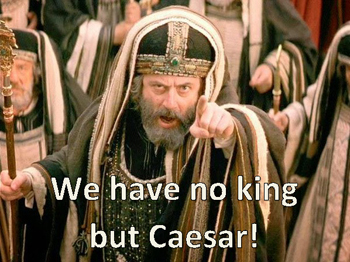
The Jews reject the Kingship of Jesus Christ
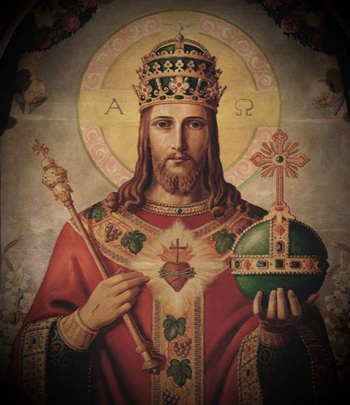
|
Today, the lines adopted in the battle to establish the Royalty of Christ are these:
"The enemy is Paganism and modern life, the means to defeat the enemy is the dissemination and clarification of papal documents. The time of battle is the present day moment. The field of battle is the opposition between reason and sensuality, between the idolatrous caprices of our fantasy and the true Revelation of God, between Nero and Peter, between Christ and Pilate. The fight is not new; only the time in which it unfolds is new." (Card. Eugenio Pacelli, Speech to Congress of Catholic journalists, 1936)
But the enemies of the Royalty of Our Lord Jesus Christ are not only those who confess themselves to be frontally opposed to His plan of Redemption.
These impious and rebellious voices are also covertly followed by those Catholics who deform the words of the Divine Master when He declared to Pilate that "My Kingdom is not of this world." (Jn 18:36). They give His words a restrictive meaning as if His Royalty were only spiritual, a royalty over souls and not a social Royalty over all the peoples, nations and governments.
When Our Lord says that His Kingdom is not of this world, Card. Pie clarifies, it is to signify that it does not derive from this world, since it comes from Heaven, and it cannot be usurped by any human power. It is not a world like those of this earth, limited, subject to the vicissitudes of the things of the world.
In other words, the expression "of this world" is linked to the very origin of the Divine Royalty and does not - by any means - imply that Jesus Christ rejects the social character of His Kingdom. Otherwise, it would be a flagrant contradiction with other words of Our Lord where He clearly affirms that "All power is given to Me in heaven and on earth." (Mt 28:18)
"If those words about the coin deprived Caesar of his divinity," says Russian philosopher Vladimir Soloviev, "the new words [All power is given to Me] take away his autocracy. If Caesar wants to reign on earth, he cannot do it at his own discretion: He must do it as a delegate of the One to Whom all power was given on earth."
The revolutionary spirit
Now then, one of the principal characteristics of the revolutionary spirit is the pretension to separate the religious life from the civil life of the peoples. It is not the expressed will of God that prevails in the laws as an imperative of right reason promulgated by the legitimate power to favor the common good. Rather, what prevails is the will of the majority, or the almighty will of all.
The efficient cause of the common good is wrongly affirmed as not being outside of and above man, but rather in the will of individuals. The public power is thus said to originate in the multitude.
Leo XIII condemns this thinking: "As far as each man's individual reason is his only rule of life, so the collective reason of the community should be the supreme guide in the management of all public affairs. Hence the doctrine of the supremacy of the greater number, and that all right and duty reside in the majority." (Encyclical Libertas of June 20, 1888)
This is why in modern society the existence of any bond "between man and civil society, on the one hand, and God the Creator and consequently the Supreme Lawgiver, on the other, is plainly to be repudiated." (Ibid)
Before the 18th century when the French Revolution tyrannically and artificially implanted the revolutionary "new law" in the world, all Western countries had political and social institutions based on the strength of Catholic customs, institutions that had not been elected by the hoax of the sovereignty of the people.
As Joseph de Maistre says: "The civil constitution of the people is never the result of a deliberation." The basic law that should rule us should not be a simple act of will, but a precept of right reason that cannot ignore and even less be opposed to the Divine Commandments. Human laws must shoot up from Eternal Law. As Leo XIII states, if the law determining what is right to do or avoid doing is left to the discretion of a majority, this is a road leading straight to tyranny.
The evil of the Napoleonic Code
It is not surprising, therefore, that Napoleon was more proud of his Civil Code than of his military victories. He became the consolidator of the Revolution, not so much for his action in the battlefield as for the codification he made of the flood of laws that emanated from the revolutionary assemblies.
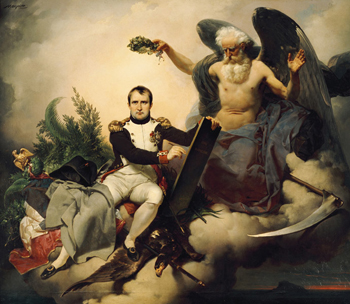
Napoleon had this painting made to show that his Civil Code would endure throughout time
|
Cambaceres [one of the authors of the Napoleonic Code] and those of his ilk put a simulacrum of order into that chaos of rationalist legislation that was concerned only with the natural order, completely ignoring the supernatural order. This Naturalism would be sufficient to establish the break of that revolutionary legislation with the Eternal Law.
But, in addition, many articles of the Napoleonic Code are in frontal opposition to Jesus Christ and His Church.
The Caesarism of the Code is manifested by the establishment of "civil marriage," by
the permission given to divorce; by the attacks against the family patrimony in its statutes on family inheritance; by
the non-recognition of religious orders; by the rejection of the Church's right to freely acquire and possess properties.
Its Ceasarism sustains the revolutionary suppression of guilds and freedom of association while it affirms the false principle of the civil and political equality of all citizens. Based on this false principle, it gives another deadly blow to the institution of the family by prescribing the equal distribution of the inheritance. Thus, through this revolutionary Code, which is the model adopted by all modern States, Christ the King was banned from the governments and laws that govern the peoples.
So, we can say with Blanc de Saint-Bonnet that "the Empire [of Napoleon] was the coronation of Liberalism, or in other words, the installation of Caesarism: the most perfect replacement of God with man, of the Church with the State since the Roman and the Ottoman Empires.
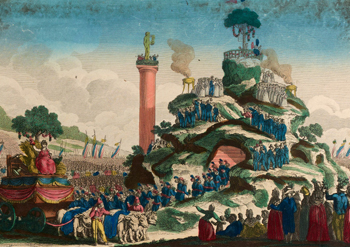
The Festival of the Supreme Being on the Champ de Mars replaced God with man |
"With this the door opens to Socialism and Communism. Liberalism leads fatally to Communism, not as a reaction, as some superficial sociologists claim, but by its very essence,
by its actual characteristics.
"It generated Atheism by its scorn for the Faith and the unbridled liberty it gave to religious and social errors. Next, it undermined property at its foundation by the way it treated the rights of the nobility, by its expropriation of the properties of the Church, by its arbitrary disposal of the family patrimony, by its consent to abuses in economic life and by its exploitation of man by man.
"Liberalism installed in States the brutal force of the masses, completely relinquishing all power to universal suffrage. Now then, Communism is based upon Atheism and finally the usurpation of capital by the force of the masses." (Blanc de Saint-Bonnet, La Legitimite)
The point of general convergence of the whole revolutionary work is, therefore, the radical denial of the Social Kingship of the Divine Savior. "We will not have this Man to reign over us!" "We have no King but Caesar!"
Hence, "the dominant error, the capital crime of this [20th] century is the pretension of divorcing society from God's government and law... The principle at the base of the whole modern social edifice is the Atheism of its laws and institutions. Even when it is disguised under the names of abstention, neutrality, incompetence or equal protection, even when it is contradicted by various details or secondary and accidental actions, the principle of the emancipation of society from the religious sphere remains at the bottom of everything. It is the essence of that which is called the 'new times.'" (Cardinal Pie, Oeuvres, vol. 7)
In order to not forsake his Faith, the Catholic must, therefore, as a member of the Church Militant, fight for the restoration of the Kingship of Christ as the only road to the restoration of true Civilization, that is, Christian Civilization, the Catholic City. And if Jesus Christ is the King of all Creation, we have in His Most Holy Mother the Queen of Heaven and Earth.
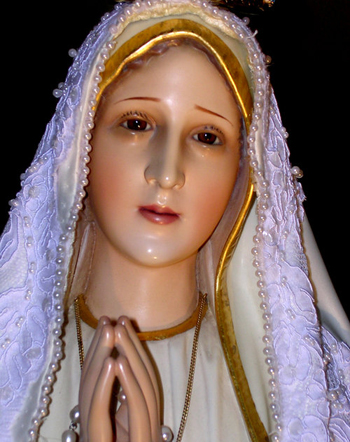
Let us ask Our Lady to hasten the full restoration of the Kingdom of her Divine Son |
St. Louis Marie Grignion de Montfort says that it was through the Most Holy Virgin that Jesus Christ came to the world, and it is also through her that He must reign in the world. This devotion to the humble Virgin Mary - so despised by the proud who are swelled up with the vain science of the world - is so linked to the whole of Catholic Doctrine that we can say that it is the last link of a chain of truths whose first link is the dogma of God the Creator.
It is this last link that prevents human society from falling into the abyss of Naturalism and Communism. The gravest questions, the greatest consequences of the human and social order depend upon these articles of the Faith, on these points of dogma now relegated to the interior of the sanctuaries.
In this month of the Rosary and of the Feast of Christ the King, let us make our ardent prayers ascend to the throne of the Mother of God so that the prompt and full restoration of the Kingdom of her Divine Son may come soon for suffering mankind.
Published in Catolicismo, October 1952


  |
Prof. Plinio Corrêa de Oliveira
| |
The Saint of the Day features highlights from the lives of saints based on comments made by the late Prof. Plinio Corrêa de Oliveira. Following the example of St. John Bosco who used to make similar talks for the boys of his College, each evening it was Prof. Plinioʼs custom to make a short commentary on the lives of the next dayʼs saint in a meeting for youth in order to encourage them in the practice of virtue and love for the Catholic Church. TIA thought that its readers could profit from these valuable commentaries.
The texts of both the biographical data and the comments come from personal notes taken by Atila S. Guimarães from 1964 to 1995. Given the fact that the source is a personal notebook, it is possible that at times the biographic notes transcribed here will not rigorously follow the original text read by Prof. Plinio. The commentaries have also been adapted and translated for TIAʼs site.
|
Saint of the Day | Home | Books | CDs | Search | Contact Us | Donate

© 2002- Tradition in Action, Inc. All Rights Reserved
|
 |

|